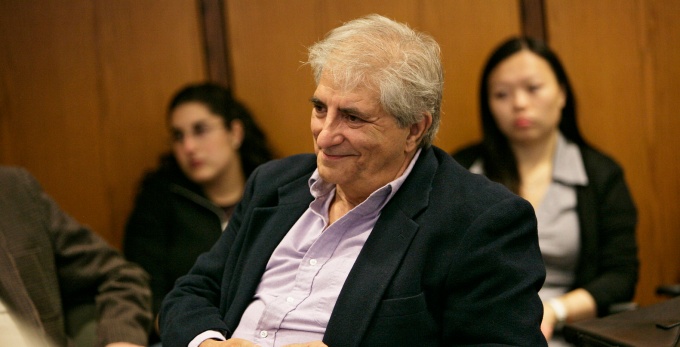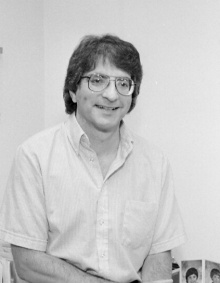
Voices in tribute to Professor James Atleson
Remembering labor law scholar and SUNY Distinguished Teaching Professor Emeritus James Atleson
Professor James Atleson, who died in late October in Cape Elizabeth, Maine, was a SUNY Distinguished Teaching Professor Emeritus at UB Law. He joined the law school faculty in 1964 and made his professional home there for more than four decades, teaching labor law, legal history, international law and human rights. He is remembered as a master in the classroom, a pioneering scholar in labor law, and one heck of a banjo player.
Dean Aviva Abramovsky wrote in a note to the law school community, “He was known for his detailed course materials, innovative use of simulation exercises to teach negotiation and collective bargaining skills, and the generous amount of time he spent working with and coaching his students.”
“Throughout his life,” Atleson’s obituary noted, “he allied himself in mind and spirit with the working people of the world, their rights and their struggles.” He brought that orientation to his scholarship and to his extensive service as a labor arbitrator in Western New York and Maine—and he brought it to his students as well. “I want them to understand that there are values behind the rules,” he told the UB Law Forum in 2001. “Lawyers used to be taught that rules were based on reason, and statutes could be understood in light of their language, legislative history and underlying policies. This approach leads many to conclude that labor law is basically incoherent, but there may be a set of values underlying the rules, which help explain their origin and staying power.”

Atleson’s 1983 book Values and Assumptions in American Labor Law changed the field of labor law, critiquing the way courts have brought long-held understandings of common law precedent to their holdings in labor law cases, sometimes contravening progressive legislation on workers’ rights. “Forty years later, folks are still talking about it,” says UB Distinguished Professor Emeritus Fred Konefsky. “It was probably the most significant book in labor law in the last half of the 20th century. He became the obligatory first footnote in labor law articles.”
Konefsky and his spouse, UB Law Professor Emerita Dianne Avery ’82, were close colleagues and friends of Atleson, and in conversation remembered a law professor of nimble mind and generous heart.
“He was just enormously humane and a very, very smart person,” Konefsky recalls. “He had a really active mind. And he was also extremely funny, with a great laugh. Though he had finely tuned points of view, he wanted to hear all points of view, and he tried to incorporate everybody’s experiences into his interactions with them. It was part of his openness.”
Avery was Professor Atleson’s student before becoming a colleague. “I took every labor course and seminar he offered,” she says. “He was one of the most outstanding teachers I’ve ever had. He was warm, engaging, funny, but he was brilliant in what he brought to the classroom. I really credit him with inspiring my career in labor and employment.”
Generations of students will also remember Atleson for his banjo playing, an avocation he picked up as an adult and took seriously. “Jim spent an enormous amount of time in Appalachia and North Carolina over the summers, going to various banjo camps,” Konefsky says. “He was always working on new ways to play and new people to play with. There were times I walked into the office in the morning and Jim was playing the banjo.”
That banjo formed the heart of the Hot Cargo String Band, an ever-changing ensemble of law students and faculty that played at many a Commencement ceremony. Why Hot Cargo? It’s an inside joke, Konefsky says: an obscure provision of federal labor law prohibiting an employer’s demand that union members won’t handle a competitor’s freight. “It’s pretty clear that Jim was trying to revive the term and remind folks that he didn’t think the legal rule should bar ‘hot cargo’ agreements and practices. This was Jim’s musical editorial comment, as obscure as it is.”
Survivors include his wife of 61 years, Carol; their sons, Michael and Jonathan; and two grandsons.
A sampling of remembrances from Atleson’s colleagues, students, and friends at UB Law and nationwide:
UB Law SUNY Distinguished Service Professor Emeritus David Engel: “Jim Atleson was our link to the past and a much smaller UB School of Law located downtown on Eagle Street. Through his stories of the growth of our law school, we newcomers could better understand the origins and unique mission of the institution we had joined. Jim was a renowned scholar and a legendary teacher, and he was an exceptionally kind individual who helped younger colleagues succeed.
“He was also a passionate banjo player. When he learned that I played the violin, he insisted that I join the Hot Cargo String Band, a group of musicians whose membership constantly changed as talented students entered and left the law school. Under Jim’s leadership, we played Old Time Music—traditional Scottish and Irish tunes that had been transplanted generations ago in the hills of Appalachia. Trained in classical performance, I had no clue how to play this kind of music, and Jim said my rendition of tunes like Soldier’s Joy always sounded like Schubert. Nevertheless, we played at BPILP benefits and performed at every graduation until Jim retired. We surprised him for the final performance by inviting back to Buffalo every student who had ever played in the Hot Cargo String Band. They were thrilled to honor him in this way. When he walked into the rehearsal at my house and saw everyone, Jim couldn’t believe his eyes. He kept saying, ‘I just can’t stop smiling.’ ”
Former UB Law Professor Peter Pitegoff: “Jim was an excellent colleague and a wonderful friend. We met in 1980 at a labor law conference at NYU Law School. He took note of my practice and initial scholarship in worker ownership—importing some of it into his teaching—and was consistently encouraging as I transitioned to academe. Jim was the only UB faculty member I knew well before I arrived in Buffalo and was a valued mentor through my 17 years on the faculty. The only hint of tension was about music—Old Time Music by his Hot Cargo String Band vs. jazz by UB’s Class Action.
“It was our great fortune that he and Carol moved to Maine about when Ann and I moved here almost 18 years ago. We’ve enjoyed many meals and good times together. He even taught art law at the University of Maine Law School. We miss Jim and share our condolences with his family and friends.”
Professor Harry Arthurs, labor law scholar and former president of York University, Toronto: “Jim and I taught a cross-border seminar on NAFTA and labor. U.S. and Canadian students were assigned roles as union or company officials and tasked with negotiating a continental collective agreement for the auto industry. Apart from two face-to-face meetings, the negotiations were conducted by email, which Jim and I monitored. We knew we were onto something good when the Canadian management team, trying to protect local jobs, were told in no uncertain terms to back off, shut up and do what their U.S. superiors told them to do.”
Professor Lance Compa, senior lecturer emeritus at Cornell University’s School of Industrial and Labor Relations: “When I went to work as a union organizer after law school, I still didn’t understand why it was so hard for workers to form unions. Then I read Jim Atleson’s new Values and Assumptions in American Labor Law. It was a ‘So that’s it!’ revelation for American trade unionists, revealing the deep, hidden currents that channeled the course of our labor law system.
“Fast-forward 20 years; Jim had applied the same analytical power to international labor law, typified by his magisterial ‘Voyage of the Neptune Jade’ in the Buffalo Law Review. Then it became my privilege to collaborate with Jim and other Labor Law Group colleagues to produce a 1,000-page textbook on workers’ rights in the global economy. We drew much of the book’s content from courses Jim had taught at the law school and feedback from his students. Jim was the driving force in bringing the book to fruition, both patient and prodding, and always working hardest of all. Scholar, teacher, colleague and friend, Jim’s work continues to influence the labor law academic community and the lives of generations of students inspired by his classes.”
Sharon Simon ’79, labor educator and retired faculty member, George Meany Center for Labor Studies/National Labor College: “I first met Jim in the ’70s when I took his basic labor law class. I then took every other labor law class he taught. I was very lucky to be in a law school that offered all of Jim’s courses—it was quite unusual to have more than one labor law course, and even more unusual to have a faculty member who was pro-worker. Jim was one of the most supportive faculty members and was highly thought of by his students.
“As time went on, I considered him a mentor and a friend. It was in large part due to his influence that I went to work in the labor movement and spent my entire work life supporting workers and their unions. His book Values and Assumptions in American Labor Law is a classic in examining the unspoken underpinnings of labor law. His support of pro-worker labor law lives on.”
Former UB Law Professor Frank Munger: “Jim Atleson was a colleague and valued friend for nearly 40 years. When I arrived at UB in 1985, Jim was already an elder statesman whose dry wit from the back of the room refreshed memories about institutional history. Jim’s office on O’Brian’s fourth floor was near mine, one of a group of offices of colleagues who became close friends. UB’s extraordinary collegial support meant ongoing discussion of research, enriching everything I wrote. Jim was a mentor and valued critic of my research on the effects of an evolving American legal system on miner-owner conflicts in Progressive Era West Virginia. I eventually moved on to other projects, but after Jim retired and moved to Maine, he kept my interest in the research I began at Buffalo in mind (and alive in my plans) by sending me articles and news stories about miners in West Virginia, along with updates about Sen. Joe Manchin, Old Time Music and, inevitably, his latest negative forecast for the Bills.
“Jim leaves other important legacies. Even as a beginning flute player I was permitted to join the faculty version of Jim’s Hot Cargo Band. I recently ‘retired’ my Hot Cargo Band T-shirt, but not without a struggle and great appreciation for Jim’s generous and inclusive collegiality. I think many of our colleagues will have similar stories about Jim, and it will be hard to imagine a world without him.”